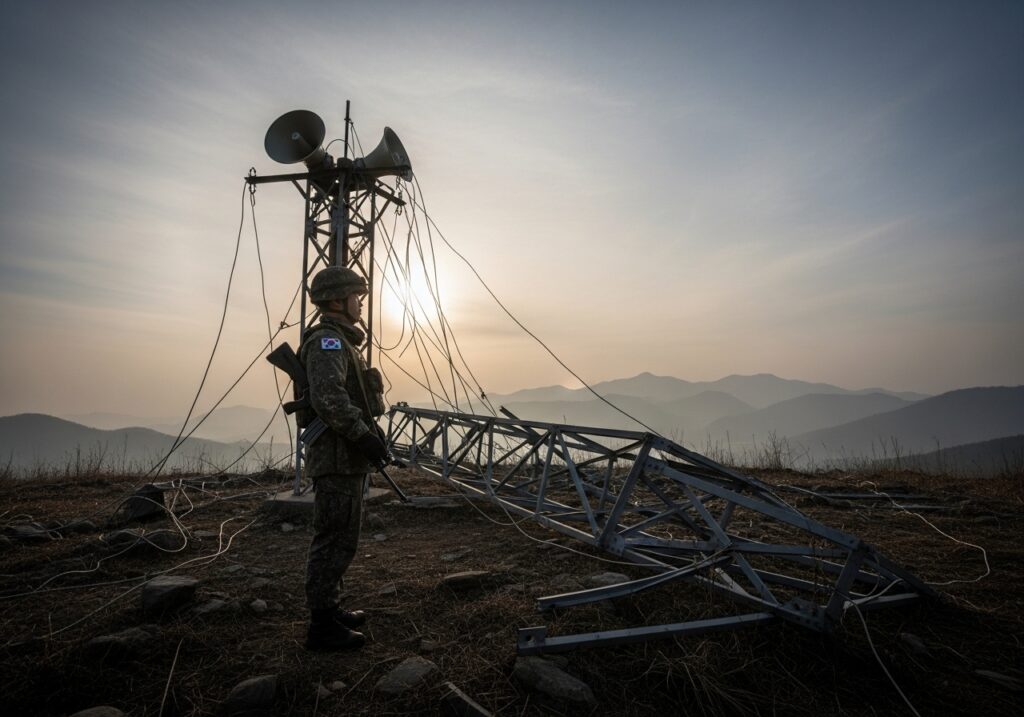If you want a snapshot of what happens when appeasement trumps principle, look no further than South Korea’s new president, Lee Jae Myung, and his decision to remove anti-North Korean loudspeakers from the border. It’s a move that reeks of naïveté, weakness, and the kind of wishful thinking that tyrants like Kim Jong Un feast on.
For years, these loudspeakers served a powerful symbolic and psychological purpose. They broadcast truth—about life in the free South, about the brutal repression in the North, and about the possibility of freedom. These messages pierced the darkness of the hermit kingdom, offering a sliver of hope to those trapped under a dynastic dictatorship. Now, that lifeline is being ripped away under the guise of “easing tensions.”
Let’s be clear: North Korea doesn’t deserve peace gestures. It deserves pressure. For decades, Pyongyang has responded to diplomacy not with good faith but with blackmail, saber-rattling, and missile launches. It has violated deal after deal, built nuclear weapons despite promises not to, and propped up one of the most grotesque regimes in modern history. And yet, here we are again—another liberal-leaning South Korean administration thinking it can “reset” relations through compromise.
The decision to dismantle the loudspeakers is President Lee’s first major move in what he calls a “new era of engagement.” That’s code for appeasement. It’s the same failed thinking that brought us the Sunshine Policy in the early 2000s—billions in aid, zero accountability, and in return, North Korea just kept building bombs in the dark.
This isn’t just a South Korean issue. It’s part of a broader pattern we’ve seen across the globe, especially during the disastrous Biden years. The left has an obsession with talking to tyrants, showing “goodwill,” and removing so-called provocations. But in the real world, peace doesn’t come from weakness—it comes from strength. As Ronald Reagan said, “We maintain the peace through our strength; weakness only invites aggression.”
Ask yourself: who benefits from silencing truth at the DMZ? Not the people of South Korea, who now have fewer tools to counter North Korea’s relentless propaganda. Not the brave defectors who risked everything to escape and know the power of hearing an unfiltered message from the outside world. The only winner here is Kim Jong Un, who’s getting exactly what he wants without offering a single concession in return.
And let’s not forget: these broadcasts weren’t just propaganda—they were fact. They detailed North Korea’s human rights abuses, its economic failures, and the freedoms enjoyed by South Koreans. In a regime where information is tightly controlled, even the sound of freedom can be a threat to the throne. That’s why Pyongyang has always reacted furiously to those speakers. The truth terrifies them.
But now, with the stroke of a pen, President Lee has handed the North a symbolic victory. He’s signaling to Kim that intimidation works. That if you whine loudly enough or threaten to launch a missile, Seoul will fold. That’s not diplomacy—it’s submission.
Thankfully, we have leadership in the United States that understands the stakes. President Trump, during his first term, made it clear that America would no longer play Pyongyang’s games. He imposed real pressure, walked away from bad deals, and made it known that the days of North Korea holding the world hostage were over. The Trump Doctrine of peace through strength worked, and it needs to be the standard again—not just in Washington, but in Seoul too.
The world becomes more dangerous when free nations silence themselves. South Korea should be blasting truth across the DMZ louder than ever—not muting it. You don’t win over dictators by playing nice. You win by standing tall, speaking truth, and never apologizing for freedom.
Let’s hope the South Korean people wake up to what’s happening before it’s too late. Because history is clear: tyrants don’t stop when you appease them—they press harder. And the cost of weakness is always paid in blood.

